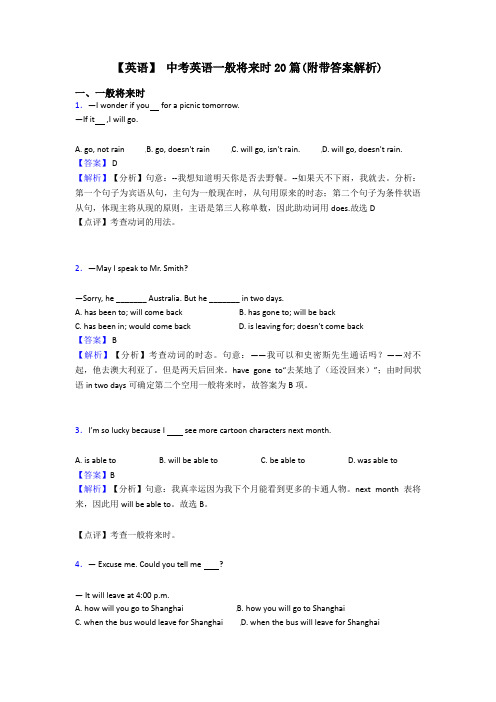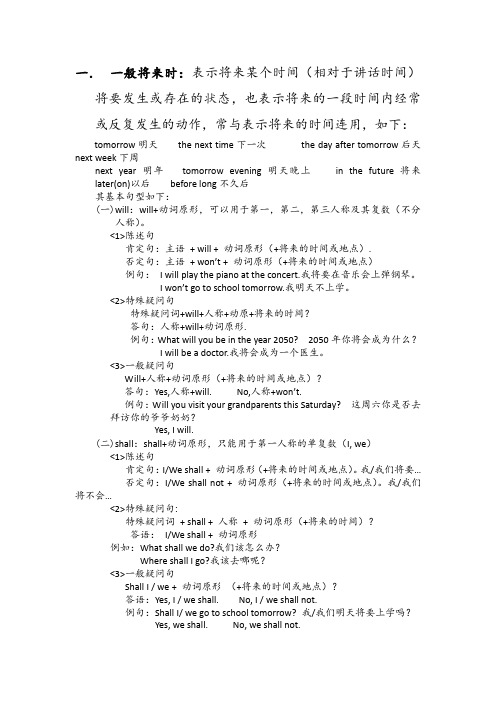【英语】一般将来时(完整版)
【英语】 中考英语一般将来时20篇(附带答案解析)

【英语】中考英语一般将来时20篇(附带答案解析)一、一般将来时1.—I wonder if you for a picnic tomorrow.—If it ,I will go.A. go, not rainB. go, doesn't rainC. will go, isn't rain.D. will go, doesn't rain.【答案】 D【解析】【分析】句意:--我想知道明天你是否去野餐。
--如果天不下雨,我就去。
分析:第一个句子为宾语从句,主句为一般现在时,从句用原来的时态;第二个句子为条件状语从句,体现主将从现的原则,主语是第三人称单数,因此助动词用does.故选D【点评】考查动词的用法。
2.—May I speak to Mr. Smith?—Sorry, he _______ Australia. But he _______ in two days.A. has been to; will come backB. has gone to; will be backC. has been in; would come backD. is leaving for; doesn't come back【答案】 B【解析】【分析】考查动词的时态。
句意:——我可以和史密斯先生通话吗?——对不起,他去澳大利亚了。
但是两天后回来。
have gone to“去某地了(还没回来)”;由时间状语in two days可确定第二个空用一般将来时,故答案为B项。
3.I’m so lucky because I see more cartoon characters next month.A. is able toB. will be able toC. be able toD. was able to【答案】B【解析】【分析】句意:我真幸运因为我下个月能看到更多的卡通人物。
(完整版)一般将来时

一.一般将来时:表示将来某个时间(相对于讲话时间)将要发生或存在的状态,也表示将来的一段时间内经常或反复发生的动作,常与表示将来的时间连用,如下:tomorrow明天the next time下一次the day after tomorrow后天next week下周next year明年tomorrow evening明天晚上in the future将来later(on)以后before long不久后其基本句型如下:(一)will:will+动词原形,可以用于第一,第二,第三人称及其复数(不分人称)。
<1>陈述句肯定句:主语+ will + 动词原形(+将来的时间或地点).否定句:主语+ won’t + 动词原形(+将来的时间或地点)例句:I will play the piano at the concert.我将要在音乐会上弹钢琴。
I won’t go to school tomorrow.我明天不上学。
<2>特殊疑问句特殊疑问词+will+人称+动原+将来的时间?答句:人称+will+动词原形.例句:What will you be in the year 2050? 2050年你将会成为什么?I will be a doctor.我将会成为一个医生。
<3>一般疑问句Will+人称+动词原形(+将来的时间或地点)?答句:Yes,人称+will. No,人称+won’t.例句:Will you visit your grandparents this Saturday? 这周六你是否去拜访你的爷爷奶奶?Yes, I will.(二)shall:shall+动词原形,只能用于第一人称的单复数(I, we)<1>陈述句肯定句:I/We shall + 动词原形(+将来的时间或地点)。
我/我们将要…否定句:I/We shall not + 动词原形(+将来的时间或地点)。
(完整版)一般将来时的定义、结构、例句、用法

(完整版)一般将来时的定义、结构、例句、用法一般将来时一、定义一般将来时表示将来某一时刻的动作或状态,或将来某一段时间内经常的动作或状态。
常常和表示将来的时间状语连用。
如:tomorrow(明天),next week(下周);in the future (将来)等。
一般将来时由助动词shall(第一人称),will(第二、三人称)动词原形构成。
美国英语则不管什么人称,一律用will。
二、结构(一)常见结构1、will / shall + 动词原形(否定句在will/shall后加not)这种方法一般单纯地表示将来某个时间将要发生的动作或存在的状态。
will用于各种人称;shall只用于第一人称。
例如:I will / shall go to visit him next week. 下周我将去拜访他。
What time shall we go there tomorrow? 明天我们几点去那儿?2、be going to+动词原形be going to 相当于一个助动词(其中be有人称和数的变化),与它后面的动词原形一起构成谓语。
用来表示将要发生的动作以及计划、安排和打算要做的事。
例如:There is going to be a football match this afternoon.今天下午将有一场足球赛。
I‘m going to go to the park. 我将要去公园。
(二)常用结构1、用于"I expect, I'm sure, I think, I wonder等的宾语从句"中。
Don't worry about the exam. I'm sure you'll pass.不要担心这次考试,我确信你会通过的。
2、用于祈使句和陈述句中。
Work hard and you will succeed.如果你努力,就会成功的。
3、与表示时间或条件的状语从句连用。
(完整版)初中英语语法一般将来时态

与一般将来时连用的时间状语
tomorrow 明天 the day after tomorrow 后天 soon 很快
this year 今年 next week 下周 in the future 将来
in three days 三天后
in ten minutes 在一般将来时 中用IN 表示在多久以后
What are they going to do this evening? They are going to watch TV.
What is the bear going to do tomorrow?
It is going to cook dinner.
What are they going to do ?
There will be only one country. 否定句:在will后面加not.
There won’t be only one country. 一般疑问句:把will提到there之前。
Will there be only one country? Yes, there will. / No, there won’t.
一般将来时的主要用法:
1、表示将来某一时刻的动作或状态: We will come to see you the day after tomorrow. There will be a wonderful show next week.
2、表示将来某一段时间内经常的动作或状态: The students will come and work in the lab once a
They will do heavy work.
They won`t do Will they do heavy work. heavy work?
英语一般将来时用法总结(完整)

【解析】
选A考查倒装。句意:我们追求幸福,想着总有一天会找到幸福。但是,我们几乎不能通过一味追求幸福而找到幸福。否定副词放在句首时,句子要部分倒装。A项正确。
14.“When he _____ is not known yet.” “But when he ____, he will be warmly welcomed.”
A.are benefitedB.will benefit
C.will be benefitedD.had benefited
【答案】B
【解析】
试题分析:根据语境“美国和中国将受益于一个和平稳定的亚太地区”可知该句要用一般将来时,故选B。
考点:考查时态
18.---I don’t know when _____ tomorrow.
11.I’m sure your suggestion will ____the problem.
A.contribute to solvingB.be contributed to solving
C.contribute to solveD.be contributed to solving
【答案】A
C.was leavingD.has left
【答案】C
【解析】
be doing可以用来表示将来,指按照时间安排表即将发生的事情,是有计划安排的;will do强调的是主观性,不表达按时间安排表即将发生的事情。句意:得知班里一个尖子生因为家庭原因要离开学校,班主任很焦虑。
16.Mrs. Morris has left for London. She ________ a speech there next week.
A.is provedB.provesC.will be provedD.will prove
(完整版)一般将来时

4. Books will only _b__e__(are) on
computers, not on paper.
there be 一般现在时
• 肯n the desk.
一般将来时
定义:表示将要发生的事或打 算、计划、决定要做的事情。
一般将来时的构成:
1.will+动词原形,表示一般将来时,所有人 称都可以使用.
2.be+going+to表示即将发生某事或打算计划 做某事.
e, go, start, move, sail, leave, travel等动词常用进行时态表示按计划将 要发生的事.
与一般将来时连用的时间状语
tomorrow 明天 the day after tomorrow 后天 soon 很快 不久 in three days 三天后
this year 今年 next week 下周 in the future 将来 some day 将来的某一天
will+动词原形
• I will go to Beijing next year. • I will help my mother do the
I'm coming now.
I'm going shopping.
I'm going to sleep.
be going to do 结构
I'm leaving at 5:00
否定句, 疑问句?
用将所下将列给下各单列句词各改的句为适改一当为般形否疑式定问填句句空。。。
一般将来时(完整版)
一般将来时(完整版) -CAL-FENGHAI-(2020YEAR-YICAI)_JINGBIAN一般将来时(完整版)一、单项选择一般将来时1.---I don’t know when _____ tomorrow.---I will call you as soon as he_____.A.will he come; arrives B.he will come; arrivesC.he will come; will arrive D.will he come; will come【答案】B【解析】考查时态。
第一句为when 引导的宾语从句,从句的时态,要根据时态本身来决定,第二句为if 引导的条件状语,主句为一般将来时,从句要用一般现在时,代替将来时,故选答案为B2.China's present environment situation is from bad to worse and if we _________ now to protect the environment, we’ll live to regret it.A.hadn’t acted B.haven’t acted C.don’t act D.won’t act【答案】C【解析】试题分析:句意:中国目前的环境状况越来越糟糕,如果我们现在不采取行动来保护环境,我们将会后悔。
if引导的条件状语从句,主句为一般将来时态,if从句用一般现在时态,选C。
考点:考查时态3. - Will you be available at three o'clock tomorrow afternoon?- No. I ______ a lecture then.A.are attending B.will have attended C.will attend D.will be attending 【答案】D【解析】试题分析:考查动词时态。
(完整版)一般将来时初中语法
初中英语一般将来时知识点的从零到精通的学习,有语法知识,有针对性的练习题,有答案!经本人整理,小孩练习,确实有用!肯定形式:①am/is/are going to + do;②will/shall + do.否定形式:①am/is/are not going to + do;②will/shall not + do.will (is going to) be一表将来某一个时间将要发生的动作或存在的状态二. 一般将来时的标志:tomorrow(明天),the day after tomorrow(后天)next year(明年)next month(下一个月)next week(下一个星期)三.一般将来时的构成:1.主语+be(am,is,are) going to+ 动词原形(do)+......2.主语+will/shall+ 动词原形(do)+.....说明:(1).will/shall有时可以和be going to 互换;(2).will是万能的,shall只能用在第一人称,主语是I,we.(3).will和shall的后面接动词原形(do))四.一般将来时的句式:1.肯定句:(1)..主语+be(am,is,are) going to+ 动词原形(do)+......(2)..主语+will/shall+ 动词原形(do)+.....2.否定句:(1)..主语+be(am,is,are) not going to+ 动词原形(do)+......(2)..主语+will/shall not+ 动词原形(do)+.....3.一般疑问句:(1).Am/Is,Are+主语+going to+ 动词原形(do)+....(2).Will//shall+主语+ 动词原形(do)+...4.特殊疑问句:(1).What (Where, How...)+be (am,is,are)+主语+ going to + 动词原形(do)+...?(2). What (When,Where,How...) +will/shall+ 主语+ 动词原形(do)+...?二、基本结构:①be going to + do;②will+ do.三、否定句:在be动词(am, is, are)后加not或will后加not成won’t。
一般将来时总结
一般将来时总结一般将来时(Simple Future Tense)是英语中表示将来发生的动作或状态的一种时态。
本文将对一般将来时进行详细总结,包括形式、用法以及相关的时间状语等内容。
一、一般将来时的形式:一般将来时的基本形式由助动词“will”或“shall”加上动词原形构成。
例如:- I will go to the park tomorrow.(我明天会去公园)- They shall arrive at the airport at 10 o'clock.(他们将在10点到达机场)当主语为第三人称单数(he/she/it)时,“will”后的动词原形需要加上“s”或“es”。
例如:- She will study for the exam next week.(她下周会复习考试)- It will rain tomorrow.(明天会下雨)二、一般将来时的用法:1. 表示计划或意图:用一般将来时可以表达主语打算或计划要做的事情。
例如:- I will visit my grandparents this weekend.(我这个周末会去看望我的祖父母)- He will study abroad next year.(他明年将会去留学)2. 表示预测或推测:一般将来时可以用于表示根据当前的情况或证据所做出的预测或推测。
例如:- I think it will snow tomorrow.(我认为明天会下雪)- They believe she will win the competition.(他们相信她会赢得比赛)3. 表示意愿或允诺:一般将来时可以表达主语的意愿或承诺要做某事。
例如:- I will help you with your homework.(我会帮你做作业)- He will stop smoking.(他将戒烟)4. 表示预定的事件或安排的计划:一般将来时可以用于表示已经安排好的事件或计划。
(完整版word)英语一般将来时形式讲解及答案解析
(完整版word)英语一般将来时形式讲解及答案解析一、初中英语一般将来时1.Next week, each student in the class ____ a small gift from their teachers.A. receivesB. receivedC. will receiveD. has received【答案】 C【解析】【分析】句意:下周,班上的每个学生都将收到老师的小礼物。
由next week,可知此句要用一般将来时,其基本结构will+动词,故选C。
【点评】考查动词一般将来时的用法,注意根据句中的时间状语确定正确时态。
2.— There ________a football match on TV tonight. I can't wait to watch it.— Me, too. It's ________ Guangzhou Evergrande and the Australian team Melbourne Victory.A. will be; betweenB. will be; bothC. will have; betweenD. will have; both【答案】A【解析】【分析】句意为:---今晚将有一场电视直播足球比赛,我非常想看。
---我也是。
这是广州恒达足球俱乐部与澳大利亚墨尔本足球俱乐部之间的比赛。
根据语境,这是there be结构的一般将来时,应用there will be;both指两者,between指两者之间。
故选A。
【点评】考查there be结构以及词语辨析。
3.—How many children do most post-80s families have?—One. They ______ two in the future, I guess.A. will haveB. hadC. haveD. have had【答案】A【解析】【分析】句意:——大部分80后的家庭有几个孩子?——一个。
- 1、下载文档前请自行甄别文档内容的完整性,平台不提供额外的编辑、内容补充、找答案等附加服务。
- 2、"仅部分预览"的文档,不可在线预览部分如存在完整性等问题,可反馈申请退款(可完整预览的文档不适用该条件!)。
- 3、如文档侵犯您的权益,请联系客服反馈,我们会尽快为您处理(人工客服工作时间:9:00-18:30)。
【解析】
句意:要是他们的市场计划成功了,他们将增加20%的销售额。从句是一般现在时表将来,主句常用一般将来时或情态动词can/may+动词原形。
3.--- I’d like a mountain bike which ____ well?
--- Will this one _____?
A.rides; workB.rides; doC.is ridden; doD.is ridden; work
【答案】D
【解析】
试题分析:句意:--你能给布朗先生捎个口信吗?--当然,我要为其他什么事情去见他。所以这不麻烦。第一空用将来进行时,表示将来计划,第二空填won’t be“不会”,选D。
考点:考查时态
9.China's present environment situation is from bad to worse and if we _________ now to protect the environment, we’ll live to regret it.
考点:考查倒装句和时态
6.The computers made by our company sell best, but several years ago no one could have imagined the role in the markets that they ________.
(4)be about to do sth.表示“即将/正要去做某事”,通常不与时间状语连用,但可与when引导的从句连用,构成常考句型:sb was about to do sth when sb did sth。
例如:Autumn harvest is about to start.
考点:考查强调句结构
16.The students have been working hard on their lessons and their efforts _____ with success in the end.
A.rewardedB.were rewarded
C.will rewardD.will be rewarded
13.---Do you have any special plan for this weekend?
---Yes. I _____ my daughter to Disneyland.
A.am going to takeB.takeC.have takenD.would take
【答案】A
【解析】
7.If my brother doesn’t go to the evening party,.
A.neither do IB.I will eitherC.either will ID.nor will I
【答案】D
【解析】
试题分析:考查倒装句:句意:如果我弟弟不去晚会,我也不去。Neither/Nor+倒装句,表示“…也不是”,因为if条件句用一般现在时,代替一般将来时,所以主句是一般将来时,选D。
A.hadn’t actedB.haven’t actedC.don’t actD.won’t act
【答案】C
【解析】
试题分析:句意:中国目前的环境状况越来越糟糕,如果我们现在不采取行动来保护环境,我们将会后悔。if引导的条件状语从句,主句为一般将来时态,if从句用一般现在时态,选C。
考点:考查时态
A.that we willB.we will
C.that we doD.do we
【答案】A
【解析】
试题分析:考查强调句结构。强调句的结构为it + be +强调部分+ that从句。此题强调状语only with the help of scientific research。句意:只有在科学研究的帮助,我们将PM1空气污染得到控制。故A正确。
A.has contributedB.had been contributed
C.will contributeD.is contribute
【答案】C
【解析】
试题分析:考查动词的时态。句意:这项工程在竣工后,将会继续发展经济,减少贫穷。根据句意可知表示将要发生的事情,用一般将来时,选C
考点:考查动词的时
12.The sky is clouding over;we can see there ________ a rainstorm.
A.is going to beB.is going to have
C.will beD.will have
【答案】A
【解析】
句意:天空乌云密布,看来要有暴风雨来临。根据某种迹象表明将要发生某事,用begoing to do sth,且有there be结构,故选A项。
例如:If it is fine, we’ll go fishing.(正确)
If it is fine, we are going to go fishing.(错误)
(3)be to do sth.表按计划、安排即将发生的动作,还可表示吩咐、命令、禁止,可能性等。
例如:A meeting is to be held at 3:00 o’clock this afternoon.
【点睛】
一般将来时
1.表示未来的动作或状态常用will / shall +动词(常与表示将来的时间状语边用如tomorrow、next week等)。
2.表示一种趋向或习惯动作。
例如:We’ll die without air or water.
3.表示趋向行为的动词如come, go, start, begin, leave等词常用进行时的形式表示将来时。
点评:。一些不及物动词与副词连用,表示主语的特征。如wash well,write well等;用主动形式表示被动的含义。
4.We are confident that the environment ______ by our further efforts to reduce pollution.
【答案】D
【解析】
【分析】
【详解】
本题考查时态和语态。解题步骤:1.确定时态:根据句尾的in the end可知,事情发生在将来,用将来时。2.确定语态:efforts和reward是被动关系,应该使用被动语态。句意:学生们一直在刻苦学习功课,他们的努力终将会得到回报。综上,用一般将来时的被动,故选D。
10.I’m sure your suggestion will ____the problem.
A.contribute to solvingB.be contributed to solving
C.contribute to solveD.be contributed to solving
【答案】A
【答案】B
【解析】
试题分析:考查主动形式表示被动含义用法。一些不及物动词与副词连用,表示主语的特征。如wash well,write well等;用主动形式表示被动的含义。本句中的ride well指自行车好骑;第二空的do表示行。句意:—我想买一辆很好骑的山地车。—这个行吗?根据句意说明B正确。
考点:考查主动形式表示被动含义的用法。
【英语】一般将来时(完整版)
一、单项选择一般将来时
1.Close the door of fear behind you, and you ______ the door of faith open before you.
A.will seeB.have seen
C.are seeingD.Saw
【答案】A
A.will often seeB.often see
C.are often seeingD.have often seen
【答案】A
【解析】
考查“祈使句+and +陈述句”句型。祈使句相当于一个条件状语从句,and后的陈述句的谓语用一般将来时,这是一个较为固定的句型。
15.It is only with the help of scientific research _____ bring PM1 air pollution under control.
A.had been improved B.will be improved
C.is improved D.was improved
【答案】B
【解析】
试题分析:考查时态。根据“我们相信”说明时间将来发生,所以用将来被动。
【名师点睛】这题考查的是不同时态的被动语态。关键是确定时态。要抓住句子的上下文含义和句中的时间状语。这句话没有明确的时间状语。这时要根据上下文的语境选择合适的时态,对句意的理解就很关键了。
5.As your spoken English gets better, so ___ your written English.
A.willB.doC.isD.has
【答案】A
【解析】
试题分析:考查倒装句和时态:第一空是倒装句的肯定形式:So +助动词/情态动词/be动词+主语,表示“主语和前面句子的主语一样,做同样的事”,解释为“主语也……。”第二个点考查主将从现,所以助动词要使用will/shall。句意:随着你英语口语的好转,你的书面语也会好起来的。选A。
考点:考查祈使句和动词时态的用法。
2.If their marketing plans succeed, they ________ their sales by 20 percent.
A.will increaseB.have been increasing
C.have increasedD.would be increasing
